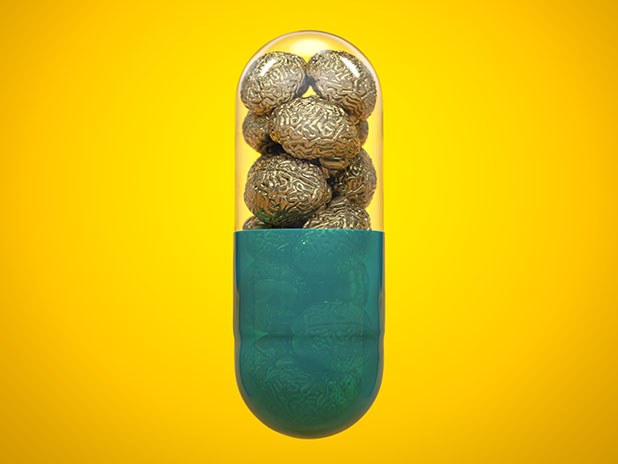The New Wave of Brain-Enhancing Drugs Is Here
Dave Asprey absolutely crushes every workday. No morning grogginess or post-lunch slowdowns. The 41-year-old Silicon Valley investor is in the zone—nailing presentations, dominating his inbox, spearheading projects—all the damn time. And he gets there by downing a handful of pills each morning.
He lists them like a litany: Aniracetam, Piracetam, CILTEP, Methyl and Cobalamin. Asprey’s cocktail is a mix of nootropics—the name given to a broad class of “smart drugs” meant to optimize the bejesus out of your brain. They’re quickly gaining steam among the workaholic set, with everyone from college students (11 per cent in the U.S. alone) to tech entrepreneurs popping them to get a mental power-up.
“It’s like unlocking one of those energy boosts in a videogame,” Asprey explains. “All of a sudden, you can do more and you’re faster and you’re smarter, and even better yet, you have more self control.”
Yes, this stuff is legal. Nootropics include prescription analeptics like modafinil, originally intended for narcolepsy, though some doctors give it to patients struggling with attentiveness. You can also order a slew of natural supplements online—made of vitamins, amino acids and antioxidants—that are kosher by law.
Here’s the claim: these drugs protect your neurons from damage, stimulate receptors and strengthen neuroplasticity, the brain’s ability to reorganize itself. This gives you an edge in memory, attention span, motivation and learning capacity—without the jitters or crashes that come with stimulants such as Adderall. Think Bradley Cooper’s mind-enhancing drug in Limitless, but in real life.
Asprey first plunged into nootropics in the mid-‘90s. After selling his first tech startup for millions, he realized something was amiss with his noggin. “Some days my mental performance was way off,” he says. “I couldn’t think of words or remember what happened in meetings.”
The brain fog worried Asprey enough that he spent 15 years and over $300,000 “hacking” his own biology. After experimenting with various supplements, he found modafinil turned his mind dramatically on. Nowadays, he mixes and matches an ever-evolving list of ingredients, even marketing some via his company Bulletproof. He’s become the de facto leader of the biohacking movement. “There are people who spend an hour a day meditating, who’ve never tried these drugs,” he says. “That’s absurd. Nootropics don’t take nearly that long and you might get some of those same benefits.”
But the science on smart drugs is still murky. While nootropics have been proven to help people suffering from dementia, there’s a lack of long-term studies on whether they’re safe for the otherwise healthy man to take. “If you’re going to experiment with these things, use at your own risk and be sure you don’t have any underlying medical conditions,” says Emily Deans, a Massachusetts psychiatrist. “But if you’re healthy, it’s probably not going to hurt.”
As with all miracle cures, Nootropics do have potential, if unsurprising, side effects. Upset stomach, insomnia, anxiousness and a slower heart rate. Deans recommends sticking to proven brain-boosting solutions, like exercise, proper sleep, healthy food and strong coffee.
Still, Asprey swears he wouldn’t as successful as he is today if it weren’t for his magic pills. What’s more, he says, the world’s best and brightest are popping them too. “I have meetings with CEOs running companies worth hundreds of millions of dollars. I’ll pull out a baggy of nootropics, and they’ll go, ‘Oh, you also do it?’ We’re all doing it.”










